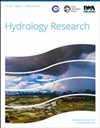Evaluation of NEX-GDDP-CMIP6 in simulation performance and drought capture utility over China – based on DISO
IF 2.4
4区 环境科学与生态学
Q2 Environmental Science
引用次数: 5
Abstract
Global climate models (GCMs) are state-of-the-art tools for understanding climate change and predicting the future. However, little research has been reported on the latest NEX-GDDP-CMIP6 product in China. The purpose of this study was to evaluate the simulated performance and drought capture utility of the NEX-GDDP-CMIP6 over China. First, the simulation skills of the 16 GCMs in NEX-GDDP-CMIP6 were evaluated by the ‘DISO’ (Distance between Indices of Simulation and Observation), a big data evaluation method. Second, the DISO framework for drought identification was constructed by coupling the correlation coefficient (CC), false alarm rate (FAR) and probability of detection (POD). Then, it was combined with the Standardized Precipitation Index (SPI) and the Standardized Precipitation Evaporation Index (SPEI) to evaluate the drought detection capability of NEX-GDDP-CMIP6. The result shows that (1) NEX-GDDP-CMIP6 can reproduce the spatial distribution pattern of historical precipitation and temperature, which performs well in simulating warming trends but fails to capture precipitation's fluctuation characteristics; (2) The best-performing model in precipitation is ACCESS-CM2 (DISO 1.630) and in temperature is CESM2 (DISO 3.246); (3) The multi-mode ensembles (16MME) perform better than the best single model, indicating that a multi-model ensemble can effectively reduce the uncertainty inherent in models. (4) The SPEI calculated by 16MME identifies drought well in arid, while the SPI is recommended for other climate classifications in China.基于DISO的nex - gdpp - cmip6在中国的模拟性能和干旱捕获效用评估
全球气候模型是了解气候变化和预测未来的最先进工具。然而,国内对NEX-GDDP-MIP6最新产品的研究报道很少。本研究的目的是评估NEX-GDDP-MIP6在中国上空的模拟性能和干旱捕获效用。首先,采用大数据评估方法“模拟与观测指标之间的距离”对NEX-GDDP-MIP6中16个GCM的模拟技能进行了评估。其次,通过耦合相关系数(CC)、虚警率(FAR)和检测概率(POD),构建了用于干旱识别的DISO框架。然后,将其与标准化降水指数(SPI)和标准化降水蒸发指数(SPEI)相结合,评价NEX-GDDP-MIP6的干旱检测能力。结果表明:(1)NEX-GDDP-MIP6能够再现历史降水和温度的空间分布模式,在模拟变暖趋势方面表现良好,但未能捕捉到降水的波动特征;(2) 在降水量方面表现最好的模型是ACCESS-CM2(DISO 1.630),在温度方面表现最佳的模型是CESM2(DIS奥3.246);(3) 多模集成(16MME)的性能优于最佳单模型,表明多模型集成可以有效降低模型固有的不确定性。(4) 16MME计算的SPEI很好地识别了干旱中的干旱,而SPI被推荐用于中国的其他气候分类。
本文章由计算机程序翻译,如有差异,请以英文原文为准。
求助全文
约1分钟内获得全文
求助全文
来源期刊

Hydrology Research
Environmental Science-Water Science and Technology
CiteScore
5.30
自引率
7.40%
发文量
70
审稿时长
17 weeks
期刊介绍:
Hydrology Research provides international coverage on all aspects of hydrology in its widest sense, and welcomes the submission of papers from across the subject. While emphasis is placed on studies of the hydrological cycle, the Journal also covers the physics and chemistry of water. Hydrology Research is intended to be a link between basic hydrological research and the practical application of scientific results within the broad field of water management.
 求助内容:
求助内容: 应助结果提醒方式:
应助结果提醒方式:


